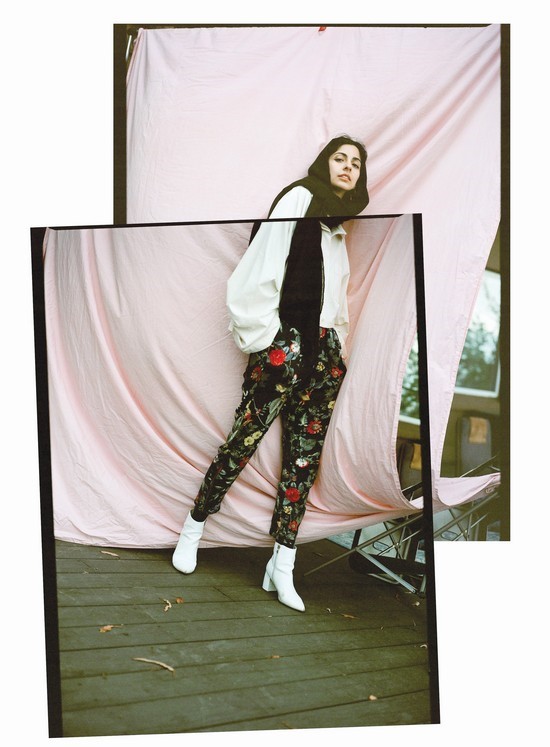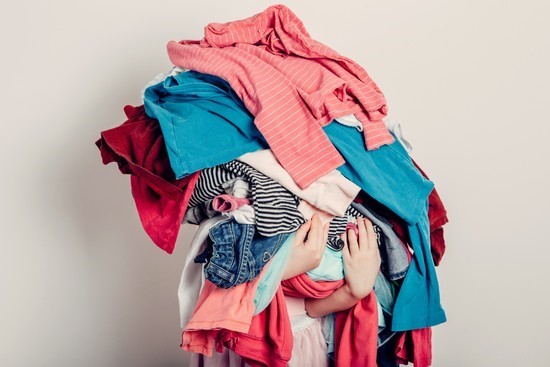The bitter complexities of fashion found
Hoda Katebi
long before she found them.
“Growing up in
Oklahoma, wearing the hijab, I had to
come to terms with being visibly Muslim,” the Iranian American organizer and
activist said. “People would call me a terrorist or pretend to run me over.”
And when policymakers held up the hijab and women’s rights as part of the
rationale for military action in
Afghanistan or economic sanctions on Iran, she
said, “that’s when I started really thinking about clothes.”
اضافة اعلان

A decade and a half later, Katebi, 27, has become a
leading critic of the global garment industry, particularly its fast-fashion
sector.
While many of us might avoid peering too closely at
our wardrobe’s iffy provenance, Katebi has devoted herself to that hidden world
— and to ultimately tearing it down.
“Rather than just, say, campaigning to get garment
workers paid a dollar more,” she said, “we’re calling for an end to the system
that puts workers in these positions to begin with.”
The “we” there is
Blue Tin Production, a small apparel manufacturing workers’ cooperative in
Chicago run by working-class women of color, which Katebi founded in 2019. Blue
Tin executes clothing contracts in ways that are antithetical to the
contemporary sweatshop: full equity and transparency, no exploitation, abuse,
or greenwashing (a term applied when a company exaggerates its
eco-consciousness). The goal is to produce high-quality luxury apparel while
shining a light on systemic issues stitched into fashion.

In addition to running Blue Tin, Katebi works as a
community organizer, speaker, and writer, all while attending law school at the
University of California, Berkeley. “I run on saffron ice cream and colonizer
tears,” she said.
(The following interview has been condensed and
edited.)
What
does abolitionism mean in the context of your work?
Fast fashion is a very
specific type of manufacturing, basically focused on speed and output. While
the rest of the fashion industry usually works on a four-season year, fast
fashion works on 52: There’s a new season every week. There’s no way that
amount of product can be created in a way that’s ethical or sustainable. The
system requires violence in order to function. Assaults on workers by managers
are common, on top of the general subjugation and enforced poverty that gives
people little choice but to do this work.
That violence cannot be reformed away. An easy
analogy is slavery — you can ask slave owners to be nicer, but the institution
is inherently violent. So Blue Tin is an abolitionist response to the
fast-fashion industry.
How
did fashion become your focus?
I discovered fashion blogs
just before college. It was a fun outlet. But some of my favorite people were
working with brands on the
BDS (Boycott, Divest, and Sanction), which is list
of companies and individuals that support Israel. They weren’t thinking about
the politics behind the aesthetics. When I created my first website, it was to
push people to think about their clothes in a more complex and nuanced way.
Everything relates to fashion. Fashion is one of the
biggest contributors to climate change, for example — it contributes more
greenhouse gases than all of maritime shipping and air travel combined,
(according to figures from the
UN Environment Program and the Ellen MacArthur
Foundation).
Then there is the connection between sustainability
and policing, which upholds the ability for cheap labor to exist. That, in
turn, allows certain neighborhoods to be disproportionately impacted by, say, a
coal power plant that pollutes the air, which in turn keeps the community there
from thriving. Any issue that you care about, you can find in fashion.
On top of that, one in six people in the world works
in the fashion industry. No one knows this because the majority of them are
working-class women of color and farmers.
Can
you provide an example of how this system resists change?
In Chicago, Los Angeles, New
York, factories will intentionally hire undocumented workers and then not pay
them for months. When the workers get upset, management calls ICE (US
Immigration and Customs Enforcement) and has a self-reported raid of their own
factory. Some of our former Blue Tin members have gone through that process.
What
are your biggest challenges at Blue Tin?
Abolition means putting an
end to this industry, and it also means thinking about the world we want to
create in its place. How can we create clothes in a way that is not violent?
That feels like a low bar, but it’s extremely complicated and stressful. I cry
about once a week.
How
does that play out on a day-to-day basis?
At Blue Tin we try to
prioritize people who are “unhirable” by the labor industry’s standards. That
means people who may not speak English, or who have child care needs, or maybe
they need to sit and process the trauma that they have been through because
they are domestic violence survivors. People who our systems have harmed in
different ways.
The year we started, one of our members got a call
that her uncle and his eight-year-old son were killed in bombings in
Damascus,
Syria. We asked her, “What do you need in this moment?” We stopped production
to go on a walk with her and to build care around her. So we were very behind
on our production, and we lost that client. At the end of the day, we live in a
capitalist world. We cannot create a utopia — so the question is, how can we
create the best of what this can be, even if it’s flawed?
I’ve noticed that you tend not to use the word
“refugees” when describing the Blue Tin team, though others do.
For me, the class
part is more important than the identity part because I hate identity politics.
And “immigrant” and “refugee” have become catchphrases in the fashion industry.
People are like, “Aw, a cute sewing circle of immigrant women.”
The team did not want to be framed by their trauma.
We’re trying to completely reimagine the fashion industry and build garment
worker power, so brands should work with us because of these incredible skill
sets and backgrounds, not because they feel bad. Oh, sure, go for the PR; I
don’t care. But really it’s the beautiful clothes, and them bringing art and
craftsmanship back to
fashion where it belongs.
How
did your consciousness around these issues take shape?
A lot of my values come from
Islamic values of divine compassion and divine mercy. Those do not sound
radical, but it actually is a radical demand that we instead live in a world of
compassion and mercy.
So I’m all for an assault on empire and capitalism.
But some nurturing is required, too. You have to hold both at the same time. I
guess you throw your Molotov, but you also give someone a hug.
Read more Fashion
Jordan News



